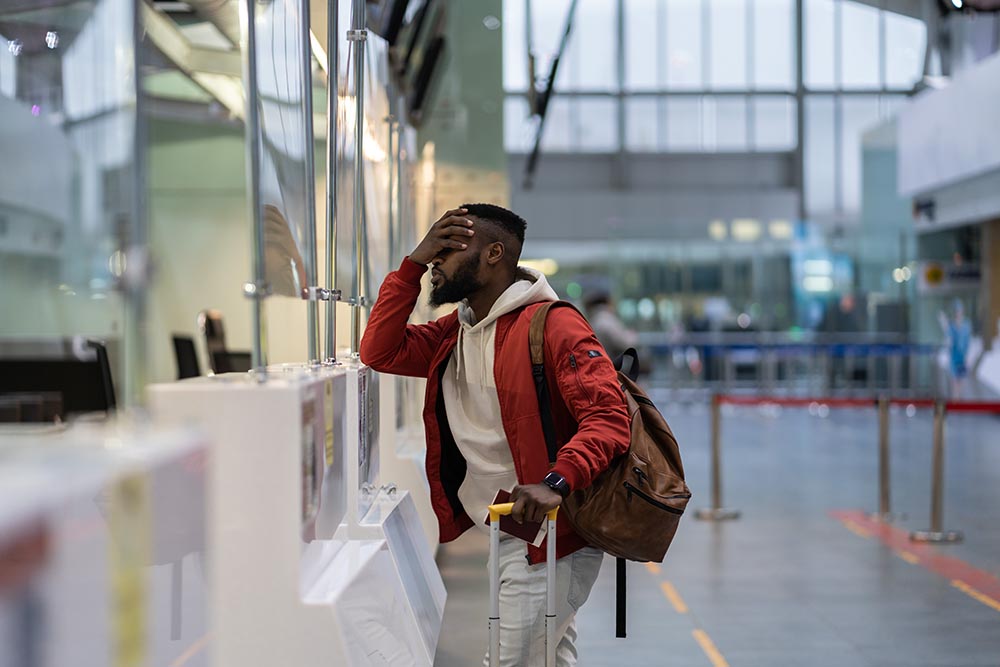You’ve probably experienced it yourself. At the gate, just before boarding, the staff announces that your flight is overbooked and they are looking for volunteers to rebook on a later flight. What is annoying for many travelers is a regular occurrence in the airline industry.
Overbooking is how airlines ensure that there are no available seats when a flight departs. So they sell more tickets in advance than there are seats on the plane. The point of all this is to ensure that the plane is full when it takes off, because empty seats are a financial burden for airlines.
According to some travel experts on overbooking flights statistics for every 100 seats available, about 150 tickets are sold. So most flights are undoubtedly overbooked. British Airways, for example, has revealed that in a single year it oversells about 500,000 seats, forcing 24,000 passengers to be rebooked on other flights.
One of the main reasons airlines overbook is to maximize profits. By selling more tickets than available seats, planes are full even when there are so-called “no-shows.” This is because many passengers simply prefer to lose a ticket if they can’t travel rather than canceling or missing their connecting flights due to delays.

READ more
The business behind the airline industry: why do airlines overbook flights
As we already mentioned, airlines overbook flights with the goal of maximizing profit and minimizing costs. If you look at the revenue generated by a flight and how it changes with different levels of overbooking, the maximum profit depends on different variables. These include the number of seats, the price per seat, the probability that the seats will be sold and that a customer will not show up, refunds for no-shows and overbooked seats.
Mathematical calculations on overbooking flights statistics show that even if the cost of overbooked seats is very high, it still makes financial sense for airlines to overbook seats. However, this does not include risks such as the impact of negative PR on the airline or decreasing demand for flights due to overbooking problems. A British airways overbooking can be just as likely as an airline overbooking with any other airlines.
Do airlines overbook flights: How do flights get overbooked?
So why are airlines allowed to overbook and why do planes overbook? It’s simple: overbooking flights allows airlines to remain profitable. This practice is based on historical data that shows that not all passengers who have reservations actually show up for their flights. An airline overbooking is needless to say a regular and completely legal practice. If you are are unlucky enough to experience an airline overbooking, then it’s important to know your rights.
The negative effects on an airline’s reputation
For example, in April 2017, U.S. carrier United Airlines had to pay $140 million in compensation to a Kentucky physician after he was forcibly dragged off an overbooked flight and lost consciousness when he was randomly selected to give up his seat but refused because he wanted to attend important appointments with his patients the next day. The video recording of the incident went viral and had a lasting impact on the airline’s reputation.
High fixed costs and low profit margins
Why do flights overbook is simple. Many airlines struggle to remain profitable because fixed costs are so high, passengers usually opt for the cheapest tickets, and seasonal factors also affect profit absorption. If only half of the seats on a flight are occupied, the airline does not generate as much revenue as with a full aircraft. Here, an airline’s load factor is a good indicator of profitability. This measures the percentage of available seat capacity that is filled with passengers.
A high load factor indicates that an airline has full aircraft and most of the seats are occupied by passengers. For airlines, there are high fixed costs associated with each flight. Each flight must have a full flight crew and support staff, a well-maintained aircraft with sufficient fuel, and services to entertain customers.
Mitigating the impact of no-show passengers
When looking at overbooking flights statistics, 0.09% of all air passengers have to be rebooked due to overbooking. Therefore, the industry maintains that airlines should be allowed to continue these long-established overbooking practices. For example, the International Air Transport Association acknowledges that seats on flights are a time-sensitive, perishable product, and some passengers with flexible tickets do not cancel their reservations, or guests cancel too late, resulting in no-shows.
To mitigate the impact airlines employ sophisticated revenue management systems that analyze the historical percentage of no-shows on specific routes. This allows flights to be overbooked with a certain degree of certainty.
Operational challenges
Airlines face a number of operational challenges and use complex flight planning and scheduling systems. They are also limited in terms of aircraft size and capacity, and therefore must plan for operational contingency. Thus, utilization must be geared toward profitability in order to make the best use of capacity. Mathematical and business calculations show that under-booking must be avoided at all costs to avoid revenue losses.
How airlines overbooking flights affects passengers
If the statistics and algorithms do get it wrong, airlines have several ways to deal with overbooking.
First, they will call for volunteers to transfer to a later flight. These volunteers must receive compensation under EU rules if they are denied boarding. Passengers flying to and from the United States are also subject to DOT regulations regarding overbooked flights. Other incentives, such as upgrades to business and first class, are often offered.
If no one volunteers, people are selected by the airline to be automatically rebooked on the next flight. Often these are passengers who booked at lower fares or who checked in relatively late for the flight. Business or First Class passengers are less affected by this rule, and a Frequent Flyer number could be useful here.
What happens if a flight is overbooked and no one volunteers?
If a flight is overbooked and no one volunteers, the airline may have to deny boarding involuntarily. In this case, there is usually a procedure for the airlines to follow that may vary from country to country and by airline. The person who is denied boarding is usually eligible for a compensation offer, which will likely vary based on the length of the delay caused by denying boarding. The person is usually selected at random and rebooked on a later flight.
How to deal with involuntary denied boarding
If a flight is overbooked and no one volunteers to change to a later flight, the airline may select passengers to be involuntarily transferred to another flight. In this case, you have a right to compensation, depending on the distance of the flight, which you can claim up to six years after the incident. Some airlines also offer you vouchers and hotel rooms, but from a purely legal point of view, they are actually obliged to offer you monetary compensation. Here are the 10 best tips for flight delays on business trips.
Know your rights
Within the EU, compensation is €250 for flights up to 1500 km and €400 for domestic flights over 1500 km and other flights between 1500 and 3000 km. All flights that do not fit into these two definitions will receive compensation of €600.
In the U.S. If you have to be involuntarily rebooked on a later flight that gets you to your final destination within one hour of your originally scheduled arrival time, then you are not eligible for compensation. For a two-hour delay, the airline must pay you at least an amount equal to 200% of the single fare to your final destination that day or $775, whichever is less. For more than two hours (or four hours internationally), this compensation is 400% of the one-way fare or $1,550, whichever is less. Find more tips for business travel to the U.S.
Furthermore, in the U.S., if there are more passengers ready to fly on a flight than seats available, airlines must first ask passengers to voluntarily give up their seats in exchange for compensation before involuntarily rebooking someone on a later flight. Airlines may offer passengers incentives such as money or vouchers to voluntarily rebook.
Safety and Security Considerations
For flights, airlines must consider a variety of factors when planning and calculating capacity, including disruptions and irregular operations, weather conditions and airspace congestion at the point of departure and destination. Operational uncertainties, crew availability and time constraints can also impact operations. Cancellations should be prevented/reduced as best as possible to achieve accurate advance planning with respect to overbookings.
How airlines can improve the passenger experience
The examples listed here, as well as numerous incidents that have already been discussed extensively in the media, show that communication and transparency are the most important factors when it comes to overbooking flights. The airlines’ overbooking policies must be clearly visible, and passengers should be informed as early as possible and also supported by the airlines in the case they are bumped.
Technological advances have enabled more accurate reservation planning and data analysis, so that the actual seating capacity of flights can often be predicted relatively accurately. Further developments in this area should help to ease the current situation. This will require efficient reservation systems and algorithms. Also, passengers need to be tracked and rebooked in real time to support accurate scheduling. Check out top 10 tips for business travel by air.
Why do airlines overbook: key takeaways
So why do airlines overbook? The main reasons is to maximize profit skimming. By overbooking flights, airlines compensate for so-called no-shows or last-minute cancellations. This is a complex analysis system based on historical flight data of passengers on the respective routes.
However, airlines should not put their own profitability above everything else, as various examples have already shown. A balance must be found between profitability and customer satisfaction in order to preserve the airlines’ reputation.
We recommend working with and booking through a travel platform like GetGoing, who are there to support you if you need expert advice and assistance in the case something goes wrong during your business trip.

